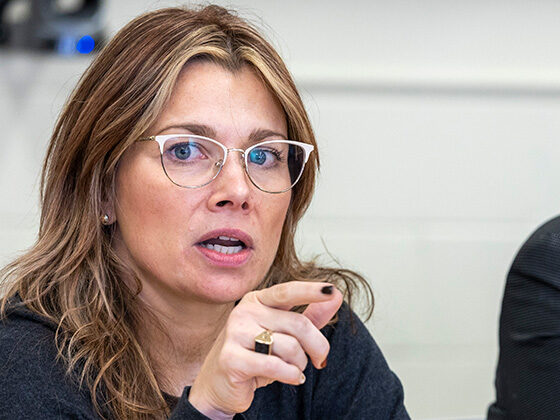News Details
Study by SP2 examines potential of direct cash for cancer patients from low-income households

Authored by: Juliana Rosati
Photography by: Krista Patton and utah51 – stock.adobe.com
Faculty & Research
06/25/24
Bradley Cooper’s One Family Foundation and the Independence Blue Cross Foundation Institute for Health Equity support research on health care and economic insecurity
Philadelphia, PA — A three-year randomized controlled trial by Penn’s School of Social Policy & Practice (SP2) is examining the potential of direct cash assistance for cancer patients from low-income households receiving care in Philadelphia, along with their families. The study, called the Guaranteed Income Financial Treatment Trial (G.I.F.T.T.), is made possible thanks to funding from actor Bradley Cooper’s One Family Foundation and a grant awarded through the Independence Blue Cross Foundation Institute for Health Equity.
SP2 Assistant Professor Meredith Doherty, PhD, LCSW, and her team have undertaken recruitment of participants at two regional cancer centers: Abramson Cancer Center at Penn Medicine and the Sidney Kimmel Cancer Center at Jefferson Health. G.I.F.T.T. provides direct cash assistance for one year to cancer patients from low-income households, along with their families, and assesses the impact of this intervention on key clinical outcomes in a two-arm randomized controlled trial.
In collaboration with co-principal investigators Dr. Amy Castro and Dr. Stacia West with SP2’s Center for Guaranteed Income Research (CGIR), G.I.F.T.T. seeks to address the role of economic insecurity in health disparities. The trial was initiated by Bradley Cooper and the One Family Foundation and selected as an inaugural project by the Independence Blue Cross Foundation Institute for Health Equity.
Cooper, a Philadelphia native who cared for his own father while he was treated for lung cancer, sought a way to help patients from low-income households who are facing rapidly accumulating costs of treatment and financial barriers to accessing quality care. That interest led him to Dr. Doherty’s research on interventions to reduce financial fallout for cancer patients and CGIR’s focus on studying unconditional cash transfers, economic mobility, and poverty.

“Cancer and the financial toll it takes on individuals and families can be insurmountable,” says SP2 Dean Sara S. Bachman, PhD., who has more than three decades of experience in health policy research and program evaluation. “G.I.F.T.T. will investigate the intersection of health care and economic security, in keeping with SP2’s mission of advancing more effective and humane human services and social policy.”
Individuals with advanced cancer and household incomes below 200% of the federal poverty line will be recruited and randomized, with patients in the intervention arm receiving $1,000 per month in unconditional direct cash payments for 12 months. The research team is using a combination of patient-reported and administrative data to determine the intervention’s impact on patients in areas including treatment adherence and completion, quality of life, and financial toxicity.
“Evidence exists that approximately 40 percent of cancer patients in the United States deplete their entire life’s assets within two years of diagnosis,” says Doherty, whose research focuses on health care and related inequities, particularly for cancer patients. “Our findings will illuminate how cancer patients use existing income support programs while demonstrating the potential of a future in which guaranteed income is a reality for people with cancer and other serious illnesses.”
In addition to holding a primary appointment at SP2, Doherty is an innovation faculty member at the Penn Center for Cancer Care Innovation, which was founded at Abramson Cancer Center to develop solutions to transform cancer care delivery, and a senior fellow at Penn’s Leonard Davis Institute of Health Economics.
The trial will produce findings following one year of recruitment, two years of data collection, and one year of analysis. The trial also aims to follow up with patients at two-, three-, and five-year intervals to gauge the long-term impact of the one-year income support on their health and well-being.
About SP2
For more than 110 years, the University of Pennsylvania School of Social Policy & Practice (SP2) has been a powerful force for good in the world, working towards social justice and social change through research and practice. SP2 contributes to the advancement of more effective, efficient, and humane human services through education, research, and civic engagement. The School offers five top-ranked, highly respected degree programs along with a range of certificate programs and dual degrees. SP2’s transdisciplinary research centers and initiatives — many collaborations with Penn’s other professional schools — yield innovative ideas and better ways to shape policy and service delivery. The passionate pursuit of social innovation, impact, and justice is at the heart of the School’s knowledge-building activities.
People
-

Meredith Doherty, PhD, LCSW
Assistant Professor
Contact
office: 215.573.1169
Email